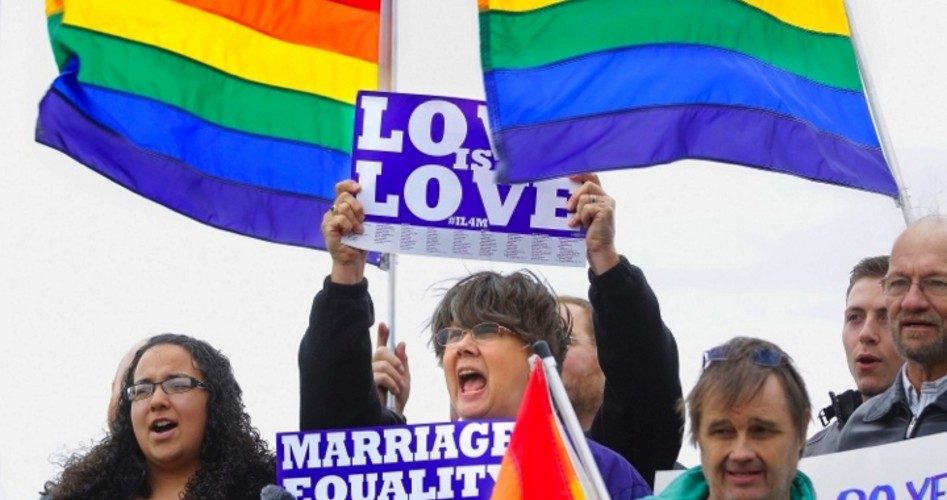
Illinois is set to become the 15th state to legalize homosexual relationships as marriage. On November 5, the state House of Representatives followed the lead of the state Senate, passing by a 61-54 vote a contentious same-sex marriage bill that had spent months in debate and consideration as activists on both sides of the issue lobbied lawmakers and hammered away at public opinion.
Democratic Governor Pat Quinn, whose 2010 campaign included a promise to push through homosexual marriage, exulted in passage of S.B. 10 and vowed to sign the bill quickly into law. “Today the Illinois House put our state on the right side of history,” Quinn said in a statement after the vote. “Illinois is a place that embraces all people and today, we are an example for the nation.”
President Obama also applauded the vote of his home state’s legislature, where he began his own political career. Obama claimed he “always believed that gay and lesbian Americans should be treated fairly and equally under the law. Over time, I also came to believe that same-sex couples should be able to get married like anyone else.” Added the president: “As I said in my inaugural address last January, our journey as a nation is not complete until our gay brothers and sisters are treated like anyone else under the law. For if we are truly created equal, then surely the love we commit to one another must be equal as well.”
Upon the governor’s signature on the bill, Illinois, which previously allowed same-sex civil unions but not same-sex marriage, will join the District of Columbia and 14 other states where same-sex marriage is legal: California, Connecticut, Delaware, Iowa, Maine, Maryland, Massachusetts, Minnesota, New Hampshire, New Jersey, New York, Rhode Island, Vermont, and Washington.
The vote came several months after the U.S. Supreme Court overturned a key part of the federal Defense of Marriage Act (DOMA), which had defined marriage as only between a man and woman for purposes of federal business. Legal observers predicted that the High Court ruling on DOMA would open the door to a parade of states legalizing same-sex marriage. Minnesota quickly passed a gay marriage law, and following the Illinois bill, Hawaii appears to be the next state set to legalize same-sex marriage.
The Illinois vote did not come without a stiff fight from pro-family groups determined to defend traditional marriage. The National Organization for Marriage diligently lobbied legislators and the public over the past year. “We’ve seen how marriage redefinition leads to those who believe in traditional marriage being punished, labeled ‘bigots’ and ‘haters’ in the public square, and forced to be silent about their deeply held beliefs or face repercussions,” warned the group’s head, Brian Brown, shortly before the vote. “And their children? They’re taught in schools that the values planted in them at home are bigoted and outdated, the equivalent of racism!”
Conservative Illinois pastors took a strong lead in standing up for traditional marriage, with the state’s African American Clergy Coalition encouraging their people to pressure legislators to vote against the bill. Some of the group’s pastors said they would work to unseat legislators who voted to legalize homosexual marriage. “I think that they will feel the crunch,” Bishop Larry Trotter, pastor of Sweet Holy Spirit Church in Chicago, told a local news source days before the bill’s passage. “I think that they cannot take for granted that they can come to the church, and get the church’s sanction and votes and signatures, and then go to Springfield, and not speak what the people want them to speak. And so now, if that’s how we have to be heard, we will be heard.”
Less than two weeks before the vote, a coalition of Catholic and Protestant groups, along with pro-family leaders, organized a rally at the State Capitol in Springfield, at which an estimated 4,000 individuals took a stand for one-man-one-woman marriage.
Following passage of the bill, the Catholic Conference of Illinois, which had taken a lead role in defending traditional marriage, expressed its disappointment that lawmakers “chose to redefine what is outside of its authority: a natural institution like marriage.” The group said in a statement that the vote “not only goes against the common consensus of the human race — which understands that nature tells us marriage is the union of one man and one woman — but it also undermines an institution that is the cornerstone of a healthy society.”
Peter LaBarbera, head of the Chicago-based group Americans for Truth About Homosexuality, said the vote represented a sad day for the Land of Lincoln. “No matter what happens through the law or what politicians do, two men will never really be married, nor will two women,” LaBarbera said. “Marriage is one man, one woman.”
He added that “as this state, and increasingly the country, kicks God to the curb, we’re setting up all sorts of new-fangled legal arrangements — and that’s exactly what homosexual so-called marriage is. It will now be easier in schools to propagandize in favor of so-called homosexual marriage.”
Photo of same-sex marriage supporters at a rally in Springfield, Illinois: AP Images


